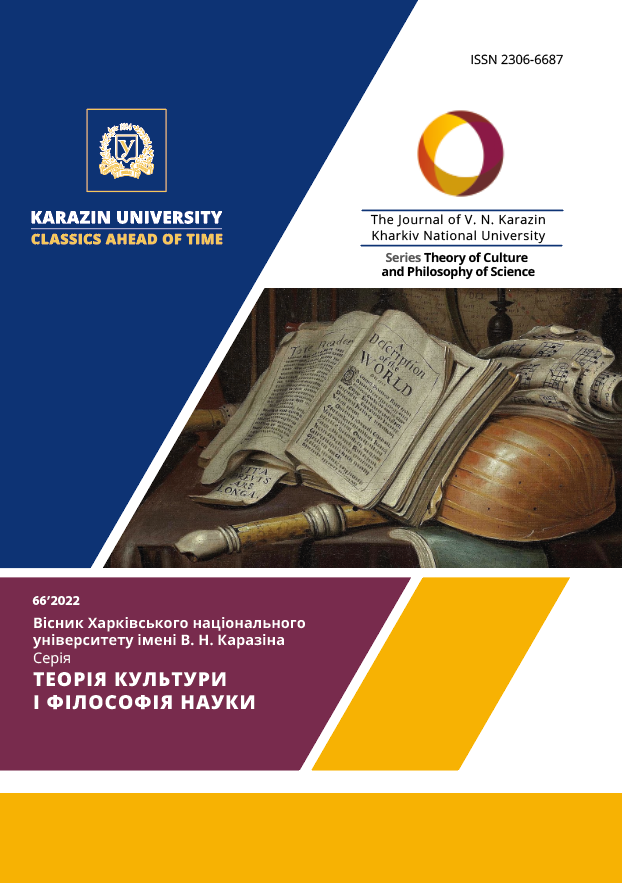DYNAMICS OF ELEMENTSOFNATIONAL CONSCIOUSNES ONTHE EXAMPLEOF ALCHEMICAL ASPECTS IN TAOISM
Abstract
The article examines the influence of alchemical aspects in Taoist medicine on the national consciousness of China during its historical development and in the modern context. The main focus of the article is directed towards exploring the stages of evolution of alchemical concepts in Chinese medicine, investigating moments of significant qualitative changes and transformations of key research objects, as well as studying the vectors of development of medical culture in China as a whole.
In the early stages of alchemical practice in China, alchemists based their teachings on philosophical foundations, which manifested in the rapid development of alchemical medicine. The result was new medicines, treatment methods, and tools. Discussions unfolded, and institutions created were associated with alchemical medical practice. The intersection of external and internal alchemy in practices such as Taoist massage and psychotherapy, where religious and magical elements correlate with physical procedures, is noted. For this stage, it is important to define the specificity of Taoism, which became the environment where medical culture in China actively developed through alchemy.
A particular emphasis is placed on the interaction of alchemical aspects with political power, specifically the support and utilization of Taoist medical ideas by the Communist Party. It is noted that this contributed to the survival and popularization of Taoist medicine in China, and Taoist concepts found their reflection in the ideology of communism, allowing them not only to survive but also to firmly establish themselves in the mass consciousness of the Chinese citizens.
In contemporary society, the medical culture of China is closely linked to everyday life. In particular, the general attitude towards health, expressed in preventive measures and the use of traditional medicine, is emphasized. Taoist concepts, such as the connection of emotions with health, continue to play a key role in the culture of treatment and health maintenance among the population.
In conclusion, the article reveals the multifaceted contribution of alchemical aspects of Taoist medicine to the formation of China's national consciousness, their evolution throughout history, and their significant role in the modern medical landscape of China.
Downloads
References
Habermas, Y. " Citizenship and national identity." Conditions of citizenship (2005): 49-70. (In Ukrainian)
Tregub, O. " Historical memory as a means of mobilizing national consciousness." (2008). (In Ukrainian)
Baidu. 黃帝內經_百度百科. 百度百科. URL: https://baike.baidu.hk/item/黃帝內經/97915 (date of application: 30.12.2023). (In Chinese).
Chan, Kelvin. "Progress in traditional Chinese medicine." Trends in pharmacological sciences 16.6 (1995): 182-187. (In English).
Gutsulyak, O. "Use of Taoism in the Chinese version of Communist doctrine." Epistemological studies in Philosophy, Social and Political Sciences 4.23 (2013) (In English).
Hsu, E. (2008). The History of Chinese Medicine in the People’s Republic of China and its Globalization. East Asian Science, Technology and Society, 2(4), 465484. (In English)
KEJI, C., & HAO, X. (2003). The integration of traditional Chinese medicine and Western medicine. European Review, 11(02). (In English)
Lin, Liang-Hung, Yu-Ling Ho, and Wei-Hsin Eugenia Lin. "Confucian and Taoist work values: An exploratory study of the Chinese transformational leadership behavior." Journal of business ethics 113 (2013): 91-103. (In English).
Ping Z., Dong Z. Taoist Medicine. Interdisciplinary journal for religion and transformation in contemporary society. 2021. Vol. 7, no. 2. P. 398–405. URL: https://brill.com/view/journals/jrat/7/2/article-p398_4.xml . (In English).
Quality evaluation of Heshouwu, a Taoist medicine in Wudang / H. Li et al. Experimental and therapeutic medicine. 2016. Vol. 12, no. 4. P. 2317–2323. URL: https://www.spandidospublications.com/10.3892/etm.2016.3580?text=abstract (date of access: 19.05.2023 . (In English).
Riddle, John M. "Theory and practice in medieval medicine." Viator 5 (1974): 157-184. (In English).
Schiffeler,John Wm. "The origin of Chinese folk medicine." Asian Folklore Studies (1976): 17-35. (In English).
Sivin, Nathan. "Chinese alchemy and the manipulation of time." Isis 67.4 (1976): 513-526. (In English).
Stephen M. TaoTe Ching. Perennial Classics, 1988. 82 p. (In English).
TAYLOR, K. (2002). “Improving” Chinese Medicine: The Role of Traditional Medicine in Newly Communist China, 1949–53. Historical Perspectives on East Asian Science, Technology and Medicine, 251–263. . (In English).
The Problem of the Origins of Alchemy Author(s): Tenney L. Davis Source: The Scientific Monthly, Vol. 43, No. 6 (Dec., 1936), pp. 551-558 Published by: American Association for the Advancement of Science Stable URL: http://www.jstor.org/stable/16270 . (In English).
Tu, Youyou. "Artemisinin—a gift from traditional Chinese medicine to the world (Nobel lecture)." Angewandte Chemie International Edition 55.35 (2016): 10210-10226.(In English).
Wang, J., Cui, M., Jiao, H., Tong, Y., Xu, J., Zhao, Y.,Liu, J. (2013). Content analysis of systematic reviews on the effectiveness of Traditional Chinese Medicine. Journal of Traditional Chinese Medicine, 33(2), 156–163. . (In English).
White, Geoffrey M. "Emotional remembering: The pragmatics of national memory." Ethos 27.4 (1999): 505-529. . (In English).
葛仙翁肘后备急方. https://www.shuge.org/. URL: https://www.shuge.org/view/ge_xianweng_zhou_hou_bei_ji_fang/ (date of application: 30.12.2023). (In Chinese)




